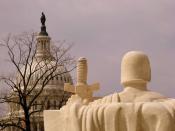In 1994, for the first time in 40 years, Congress was drastically changed. The Democratic majority was uprooted and new, lively, freshmen were instated with a job to undertake. As part of the Republican=s AContract with America,@ these new Republicans had to revise the current Congressional term limit status. In undertaking this task, these men and women ran into a seemingly stone road-block. This roadblock consisted of long-term, carreerists who were unwilling to change. The problem was not that there were no Congressmen who were committed to real change elected in 1994 because there were, but Congress was highly dominated by long-term careerists in both parties who seemed to have more loyalty to the system than to their constituents. As Thomas Jefferson put it, 'Whenever a man has cast a longing eye on offices, a rottenness begins in his conduct.' (Oxford dictionary of quotations, p.272) Over time, career legislators are more likely to promote the interest of the establishment of which they are part than that of the larger public.
This fact is not surprising. If most of a persons time is spent meeting with lobbyists, constituents, and bureaucrats, that person may actually come to believe what these influential people are saying. This is why new blood needs to enter Congress more frequently, in order to avoid the highly influenced Congress that is filled with old people with old ideals. Needless to say the once optimistic freshmen were unsuccessful in their task, and it=s plain to see why. Until that changes, Congress is not going to change. Congressmen need to get back to basics and realize that they are in office to serve their people, and not themselves.
What would change Congress is term limits. By the middle of last year nearly half of the states had restricted, almost all...


